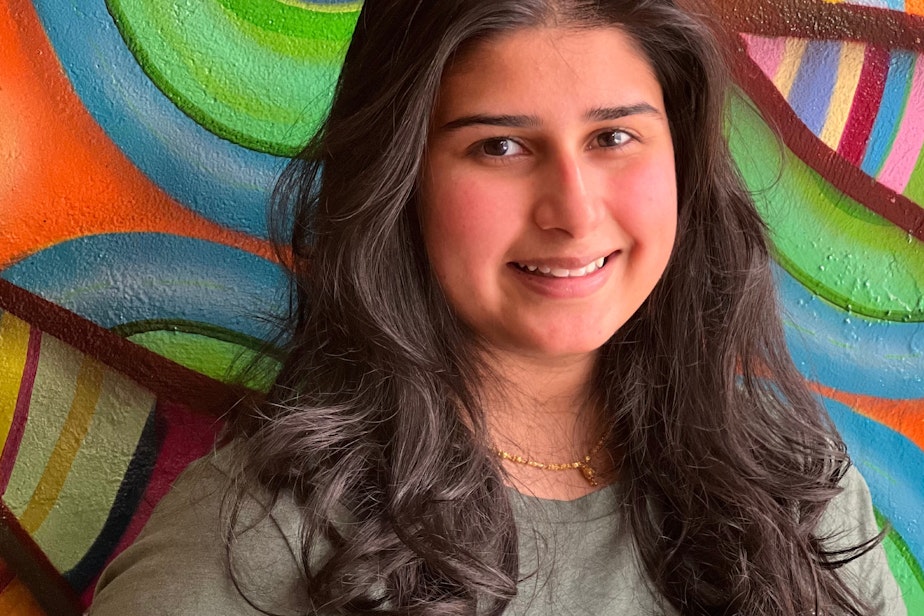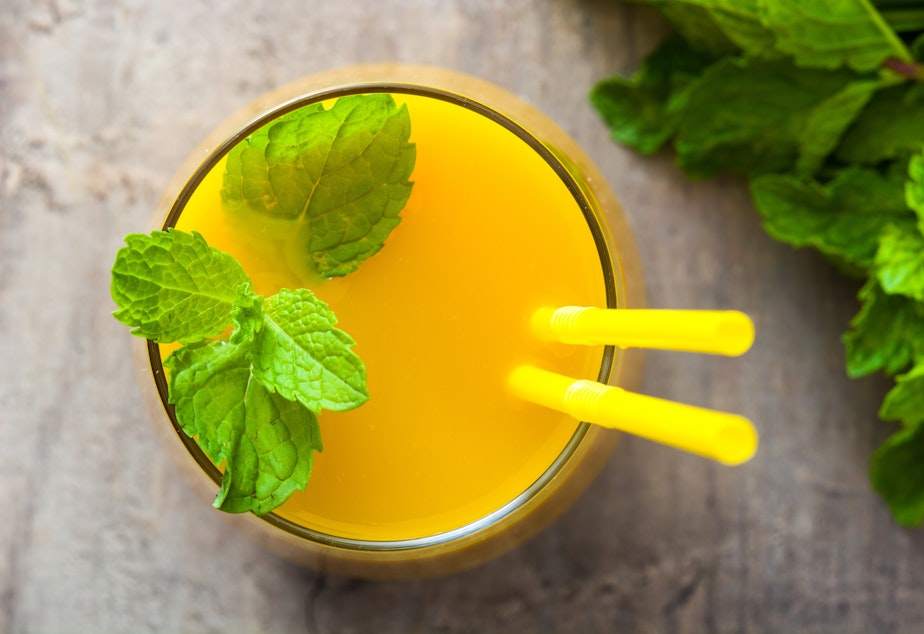Food for thought: Embracing culture in the kitchen

RadioActive's Adar Abdi and her friend Heena Vahora love food — cooking it, eating it and talking about it.
They're also both first-generation Americans, who say they know the feeling of being the odd one out. In this conversation, the two discuss culture, diversity, family and the beauty of food — all while cooking together.
[RadioActive Youth Media is KUOW's radio journalism and audio storytelling program for young people. This story was entirely youth-produced, from the writing to the audio editing.]
Transcript:
Adar Abdi: So, Heena, can you first tell us where we are?
[Sounds of cooking in a kitchen: Microwave beeping, frying pan sizzling, pots and pans clanging]
Heena Vahora: We are in White Center in my kitchen. I have lived here my whole life, and it's the only place I know as home.
Sponsored
Adar: Okay, I have to ask — since I can already smell the amazing aroma in your house — please tell me what you're cooking.
Heena: Yes, of course! I'm currently trying to make tandoori chicken. My mom has always made it for me growing up. And because it's Ramadan, we want to spice it up a little, and try different recipes out.
Adar: Yum, that sounds delicious! Can you tell me a little bit about your culture? Maybe some of your favorite foods?
Heena: Yeah, so my parents come from India and we are Gujarati. So we eat a lot of sak, which is like stir fry. Something that I really enjoy making is butter chicken and mango lassi. I even have a cat named mango lassi. So I really enjoy making it.
Adar: Aw, that's so cute! I love that name for a cat.
Sponsored
Adar: Tell me, why is food important to your family?
Heena: Whenever we eat food, we're happy. We feel safe and we feel secure. Food just brings a sense of community. And whenever someone makes food for you, it makes you feel loved and appreciated.
Adar: I definitely feel the same. Who did you learn to cook from?
Heena: I learned to cook from my mom and my older sister. My mom loves cooking food and loves trying different recipes. She also loves trying food from different cultures as well.
Sponsored
Adar: I love that you and your mom have that connection.
Can you tell me a little bit about you growing up with being a different culture than American and how that made you feel?
Heena: Yeah so growing up, I remember being in elementary school, and when we went on different field trips, we always had, like, my peers' parents bring different foods for their kids. And I remember my dad always offering to pack me lunch, like cultural lunch. And I would always refuse because I'd always be scared of what other students thought of my food, how I would eat it and how it would smell. So I'd always bring Lunchables and be like, 'No, I'm taking Lunchables to school.' Or like PB&J. I always remember arguing with him. But to this day, I really regret it.
Adar: I went through that also. I feel like it’s such a child of immigrant experience to have, or that first-generation experience. But besides that, did you ever feel any other type of shame surrounding your culture?
Heena: Yeah, I did. I would always have kids asking me different questions and different things about my culture, like, 'Why do they wear that red dot on their head?' And then also about my different foods and things like that. Kids would always say things to me like, ‘Do you eat curry every day?’ And, ‘What kind of curry do you guys make?’ I felt as if my culture was a joke to the other students and that made me feel embarrassed about who I was and my culture.
Sponsored
Adar: Yeah, that’s the worst feeling. So can you tell me, when did the love of your culture and cultural foods come through then?
Heena: I feel like the love of my culture and my cultural food came in middle school, when I finally got involved in my community and started recognizing who I really was, who I represented, and who my community was. That's when I really started to recognize that my culture was unique and beautiful.
Adar: Wow, that's amazing. Can you give some advice to the younger generation or younger people that are also going through the same aspect of shame about their culture?
Heena: Yeah, really don't care about what other people think. Care about what makes you happy and what makes you feel okay and safe. And remember, your culture is yours, and no one else should have a say on what that means.
Adar: I definitely second that. Can you tell me, finally, what makes food so beautiful?
Sponsored
Heena: The diversity. The diverse foods, all the different spices, all the different ingredients you can add, and just the feeling it makes you feel when it's in your mouth.
Sometimes it's really spicy, or too sweet. Or sometimes, it's in between. My family always makes comments, like, whenever I eat even the tiniest bit of spice and my whole face turns red. And it just, like, brings up laughter and happiness.
The beauty is really the memories you get from food.
This story was produced in a RadioActive Youth Media Advanced Producers creative audio workshop for high school and college-age youth.
Production assistance by Esmy Jimenez and Lucas Galarneau. Prepared for the web by Kelsey Kupferer. Edited by Diana Opong.
Find RadioActive on Instagram, Twitter, TikTok, YouTube and Facebook, and on the RadioActive podcast.
Support for KUOW's RadioActive comes from the Bill & Melinda Gates Foundation Discovery Center and BECU.
If you have any feedback on this story, you can email RadioActive at radioactive@kuow.org, or click the teal feedback tab on the edge of this page. Reach out, we're listening.




